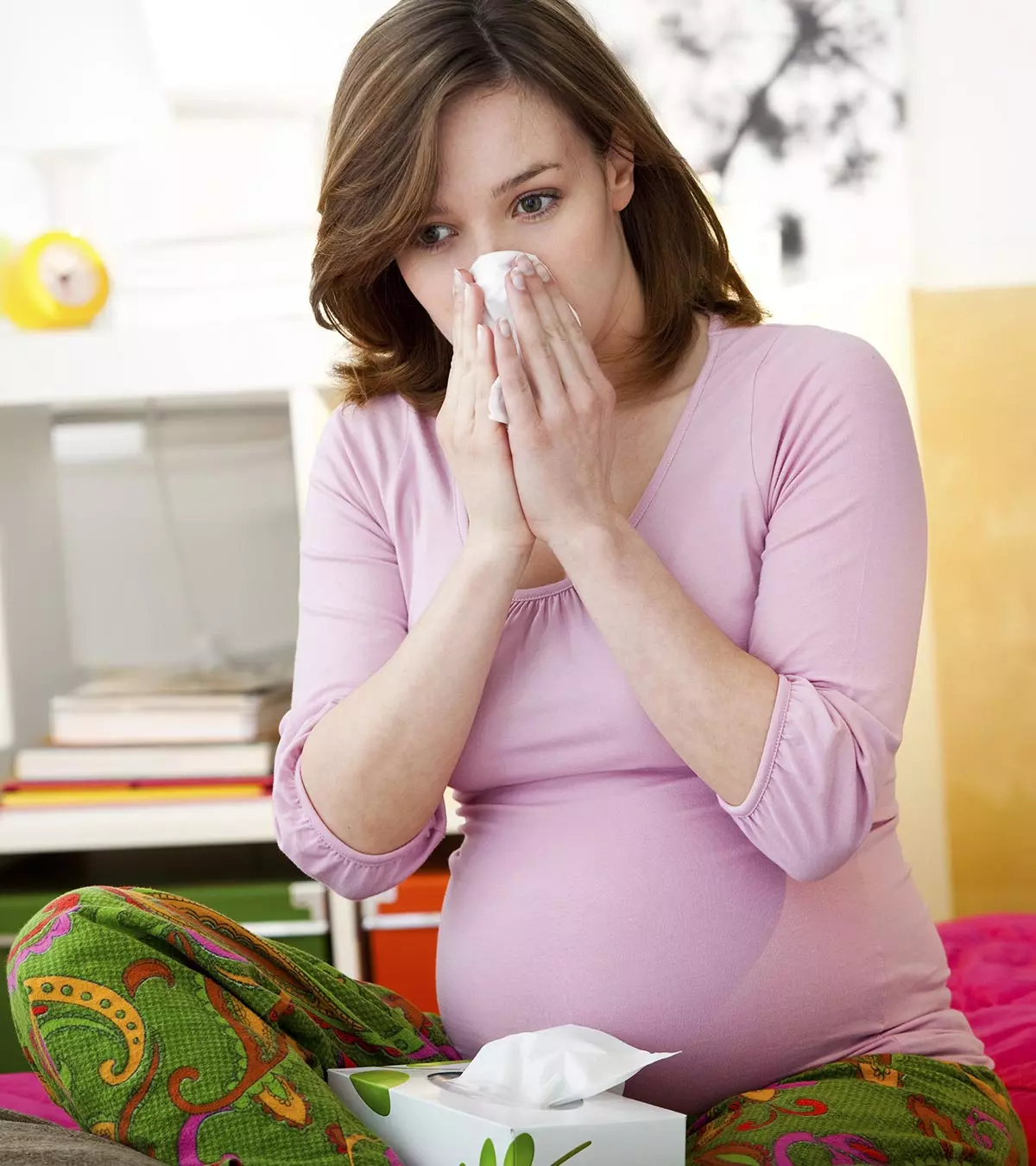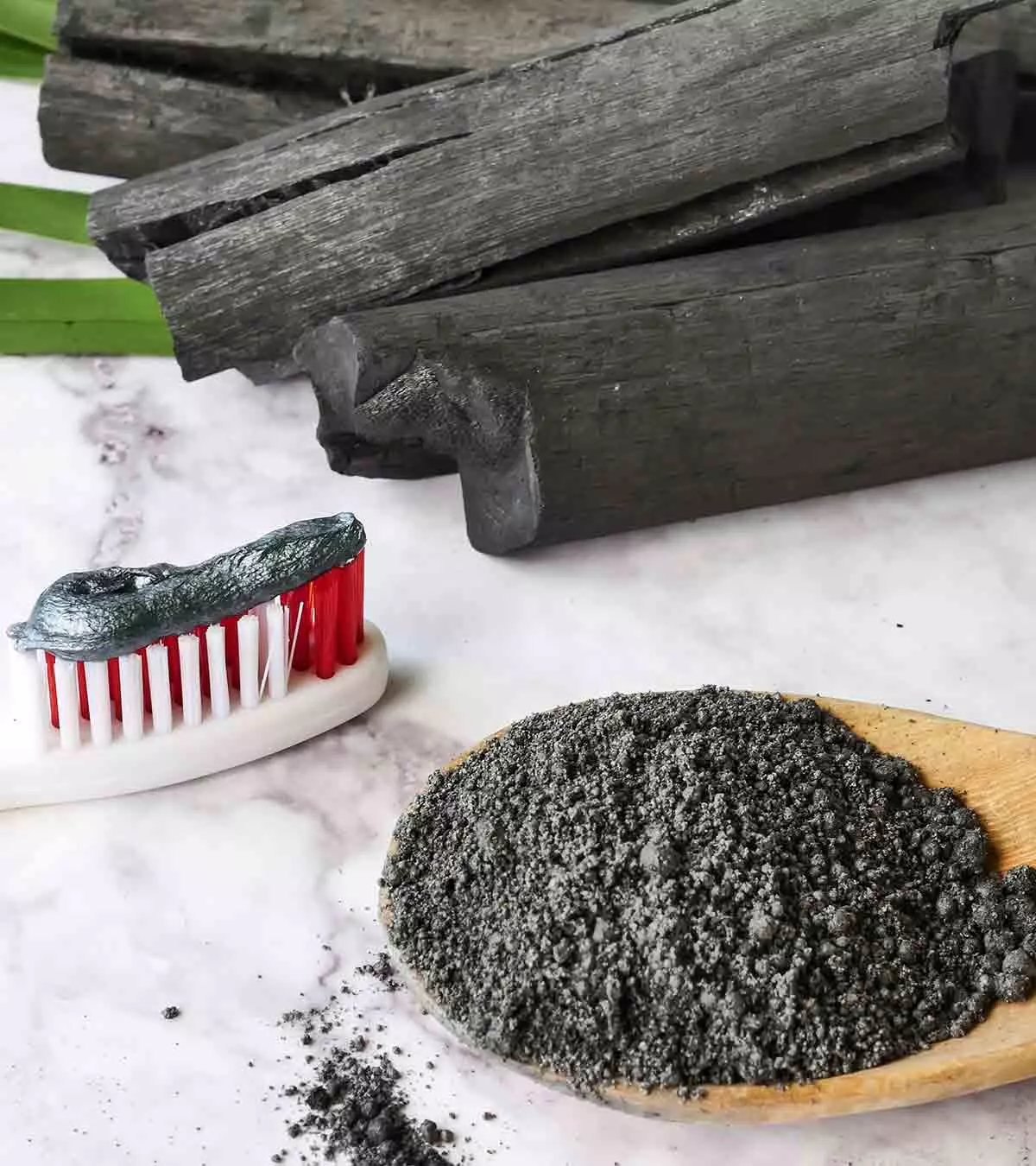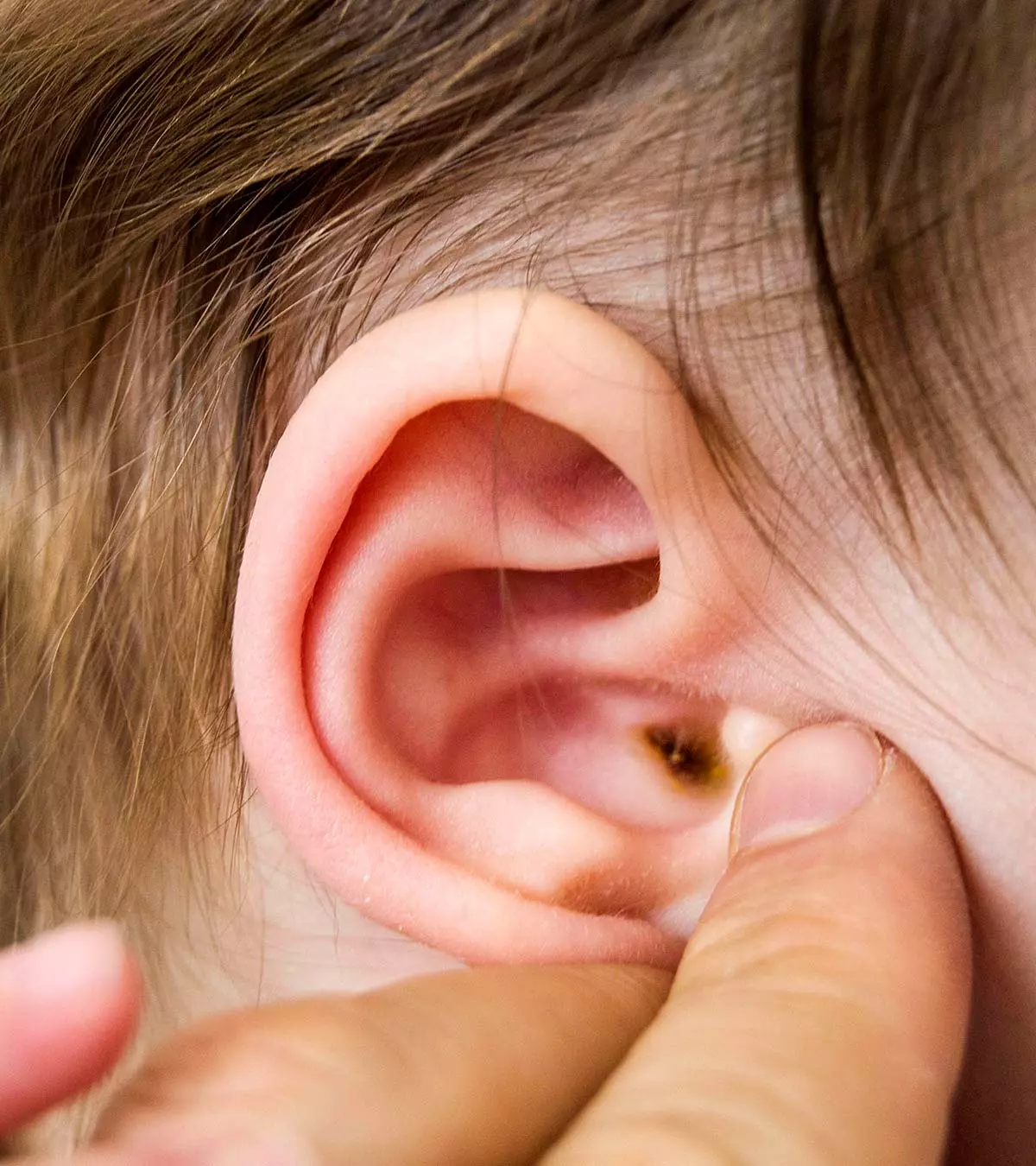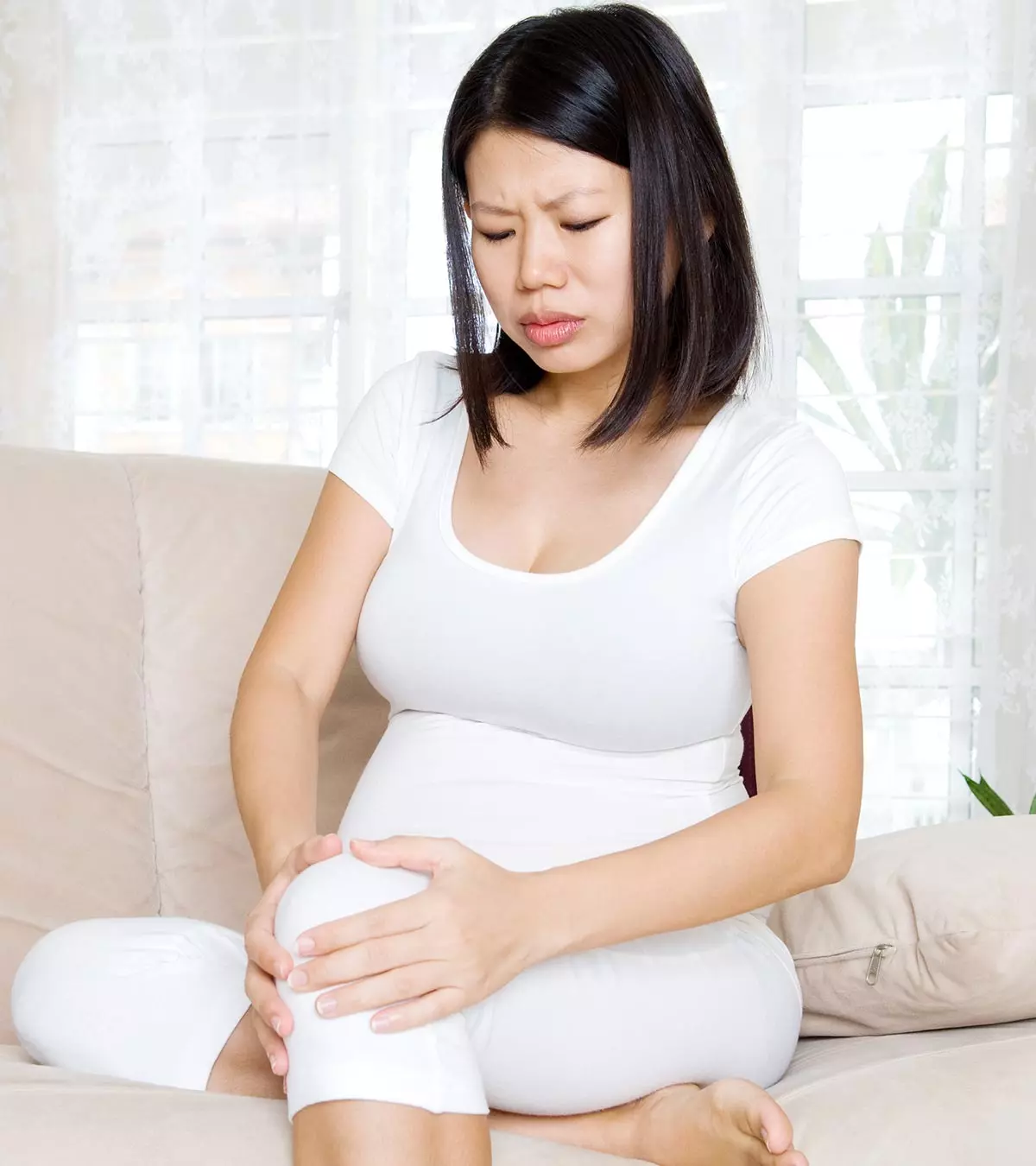
Image: Shutterstock

Key Pointers
- Pregnancy rhinitis is common during the first trimester and typically improves after delivery.
- While it is not harmful, it can cause discomfort when breathing and sleeping.
- Colds, infections, sinusitis, allergies, or pregnancy hormones can trigger pregnancy rhinitis.
- Symptoms include a runny and itchy nose, coughing, itchy throat, and swollen eyes.
- Home remedies that may help relieve pregnancy rhinitis include inhaling steam, using a humidifier, saline spray, homemade nasal lavage, drinking ginger tea, and staying hydrated.
What Is Pregnancy Rhinitis?
In most cases, a stuffy nose in pregnancy can be due to swollen blood vessels and excess mucus production, resulting from hormonal changes such as increased estrogeniA sex hormone responsible for the development of female sexual characteristics levels and high blood volume. This is also called pregnancy rhinitis or nasal congestion during pregnancy, and it is often similar to a cold. Although it is not a serious cause of concern, it may sometimes lead to severe discomfort. Approximately 30% of women develop nasal discomfort during pregnancy (1) (2).
Home remedies such as inhaling steam and using humidifiers may provide relief of nasal problems in pregnancy. However, it is recommended to seek a doctor’s advice and take medication to treat nasal congestion in pregnancy.
Read on to know the causes, associated symptoms, treatment, and home care measures to manage stuffy noses during pregnancy.
 Quick fact
Quick factIs Rhinitis Dangerous During Pregnancy?

Pregnancy rhinitis can cause mild to moderate effects on the mother and baby. Although not dangerous, it could cause sleep issues and keep you up at night due to breathing difficulties. This will also affect your fetus’s ability to receive the necessary oxygen essential for development (3). It may cause chronic sinusitisiAn infection in which the tissues that line the sinus get swollen or inflamed (hollow, air-filled spaces in the skull) or ear infections if you are also suffering from allergies (4).
You can recognize the condition with a few tell-tale signs, which we list next.
What Are The Signs And Symptoms Of Pregnancy Rhinitis?

The most common symptoms you may experience are (5).
- Stuffy, itchy, or runny nose
- Constant coughing and sneezing
- Itchy throat and nose
- Itchy, swollen, or watery eyes
- A stuffy feeling in the sinus cavities and associated sinus headache
- Disturbed sleep caused by nasal congestion
If these symptoms continue for a couple of weeks, then you should check with your doctor for timely treatment. These symptoms may even last for a few months, and knowing what is causing the problem could help address it with the right treatment.
What Are The Causes Of Pregnancy Rhinitis?
Some cases of nasal congestion are benign, which means there might not be any particular reason other than pregnancy, which is causing the nasal decongestion.
But sometimes, a stuffy nose might also be caused due to the following reasons:
- Cold or infection: Is associated with coughing, sneezing, mild aches, sore throat, or fever (6).
- Sinusitis: Symptoms of sinus infection include fever, headache, yellow or green mucus, sinus pressure or facial pain (that worsens when you bend), low sense of smell, or an upper jaw ache (7).
- Allergies: You may have a stuffy nose along with watery mucus, sneezing, and itchy eyes, throat, nose, or ears. Allergies are unpredictable during pregnancy, as you may become sensitive to allergens or other irritants that have never bothered you earlier (8).

It may be difficult to figure out the actual cause of your nasal congestion, as there can be more than one. For instance, you can have both pregnancy rhinitis and an allergy at the same time. Therefore, you must see a doctor if any of the above symptoms last beyond a week or two.
Medical treatments could help relieve the symptoms of rhinitis based on the underlying cause. However, you could first consider trying some home remedies that might provide relief.
What Are Some Home Remedies For Pregnancy Rhinitis?
There are some simple and natural remedies you can try to get some relief from the annoying symptoms of a stuffy nose. These options offer a safer way to relieve symptoms during pregnancy, especially in the first trimester when it’s best to limit medication.
1. Inhaling steam
Take some hot water in a bowl. Put a towel over your head and inhale the steam from the hot water. Try to breathe in and breathe out for some time. This helps relieve nasal congestion and lets you breathe better (9).
2. Using a humidifier
Using a vaporizer or humidifier in your room when you are sleeping might increase the moisture in the room and helps in ridding you of the stuffiness.
You should clean the humidifiers regularly and change the water so that there is no bacterial growth.
3. Saline drops or sprays
Saline sprays contain a salt solution. You can drip a drop into each nostril, which might help to clear a stuffy nose.
Salma, a mother, shares her experience of getting pregnancy rhinitis during the fourth month of pregnancy. She visited an ENT doctor who recommended she try seawater nasal spray, which is a type of saline nasal spray. Salma says, “I called an ENT (ear, nose and throat) doctor…He then prescribed to me a nose spray…It’s a solution made of 100% natural isotonic seawater that helps irrigate nasal passages and sinuses and relieve the congestion…sniff it at each passage as hard as I can several times a day for a few days. It’s 100% safe, and honestly, it worked WONDERS !! By the 3rd day, the congestion along with the headache was absolutely gone (i).
4. Homemade nasal lavage
Nasal irrigation may also offer some relief from a stuffy nose. Take one pint of sterile water and add a teaspoon each of salt and baking soda. Mix well and pour some into your palm or neti pot. Then sniff it into each nostril and repeat until you feel relieved. Repeat it twice or thrice a day and make fresh lavagei every time. By following this approach, the transmission of infection to other sinuses can be prevented while also decreasing postnasal drip. (10).
5. Blowing your nose
Hold one nostril with your thumb and gently blow through the other. It will force the air to exit through one nostril at a time, thus clearing the passage. Repeat the same with the other nostril.
6. Keeping your head elevated
Use extra pillows to raise your head while sleeping. This might help relieve nasal congestion.
7. Exercise

Light exercises or brisk walking might clear nasal congestion. But do not exercise outdoors as air pollution can aggravate your congestion. Do cardiovascular exercises regularly for better airflow and sleep (11).
8. Avoiding irritants
Cigarette smoke, paints, alcohol, and strong-smelling agents, as well as allergens, could act as triggers that aggravate your condition and must be avoided.
9. Staying hydrated
Have lots of water, broth, and citrus juices as they might help reduce congestion and keep you and your growing fetus healthy.
Cut down on caffeine and caffeinated drinks to avoid dehydration (12).
10. Applying petroleum jelly
A burning sensation is created due to the inflammation of the dry nasal passage. To keep the passage moist, you might consider applying some petroleum jelly using a cotton swab.
11. Taking vitamin C-rich foods
Increase vitamin C in your diet to reduce the risk of a nosebleed during pregnancy. You could have kiwis, tomatoes, oranges, and bell peppers (12).
12. Acupressure (bridge of the nose point)
Press the points at the bridge of the nose and the eye sockets with your thumbs for about five minutes. You can press the two points one after the other or at a time. Applying the right pressure at the right place, might help to get rid of mucus and congestion (13).
13. Keeping your legs warm
Fill up the socks with mustard seeds and wear them during bedtime. It is believed that this will keep your legs and body warm and reduce the swelling in the tissues of the nose.
14. Horseradish mixture
Horseradish is known to fight bacteria and improve immunity. Combine finely chopped horseradish, apples, and a bit of sugar. Take about two tablespoons of it every day to get relief from a stuffy nose (14).
15. Ginger tea
Ginger contains anti-inflammatory properties (15). So, try to start your day with a hot cup of ginger tea made with freshly grated ginger and a little honey. It could help clear the nasal passages and improve your fluid intake.
Before following any of these remedies, check with your doctor about their suitability. Once you get the approval, you could try them. Certain situations, however, require you to see a doctor immediately.
How Long Does A Stuffy Nose Last?
A stuffy nose may start in your second month of pregnancy and get worse as the pregnancy progresses. It usually eases up after delivery and disappears within two weeks of delivery (16).
However, if the symptoms get aggravated or if the natural remedies fail to provide relief, then you might consider seeking professional advice.
When To Contact A Medical Professional?
If you have been suffering from pregnancy rhinitis for more than two weeks or if you have sleep issues associated with a stuffy nose and snoring, then you must see a medical professional. Consult a medical professional if your nasal congestion worsens, lasts longer than two weeks, or comes with severe headaches, facial pain, or fever. Do not take any medication without your doctor’s prescription. If you have taken any medications, then let the doctor know about it.
The medical practitioner may also suggest a few tests to ensure that there is no underlying infection or to get a better understanding of the condition.
 Point to consider
Point to considerWhat To Expect At The Hospital?
Your healthcare provider may examine your nose, throat, ears, and airways. They might suggest a few tests, if necessary:
- Blood and skin tests in case of allergies
- A throat culture and sputum culture
- X-ray of sinuses
- Chest X-ray
Depending on your symptoms and the test results, the doctor prescribes medications to treat the condition.
What Is The Treatment For Pregnancy Rhinitis?
It is best to avoid medications, especially in the first trimester. But if your condition is unbearable, then the doctor might prescribe some medications that are safe to use during pregnancy. These medical treatments should be taken under your doctor’s supervision, and only when the home remedies fail to provide relief.
1. Nasal decongestant sprays

As the sprays are not oral medications and cannot cross the placenta, they are safe. They ease the condition quickly, but the congestion could come back and get severe (17). Your doctor might prescribe a few over-the-counter nasal decongestant sprays such as Afrin, Vicks, Neo-synephrine, and Mucinex.
2. Antihistamine sprays
Allergic rhinitis is caused or aggravated due to the release of histaminesiA chemical produced by the immune system in response to allergic reactions . AntihistaminesiMedications that help relieve allergic symptoms , therefore, help control severe symptoms. First-generation antihistamines are considered safe during pregnancy (18). A few over-the-counter drugs are Astepro (azelastine) and Astelin (18).
3. Nasal steroid sprays (intranasal glucocorticoid sprays)
They are safe to use for mild to moderate symptoms of stuffy nose related to allergies. They also work effectively on postnasal drip symptoms such as chronic cough, mucus running down the throat, and hoarse voice. Nasacort AQ (triamcinolone), Flonase (fluticasone propionate) (19), Omnaris (ciclesonide), Nasonex (mometasone), Veramyst (fluticasone furoate), and Rhinocort Aqua (budesonide) are some common intranasal steroid sprays that can be used (20).
Nasacort AQ nasal spray that is available over the counter is known to carry certain side effects such as abnormalities in the respiratory system and choanal atresia (blockage of nasal airways) (21).
4. Antihistamine tablets
If you do not like using nasal sprays, then antihistamine tablets such as Zyrtec (cetirizine) and Claritin (loratadine) can be used. As they are less effective than the nasal sprays, and there is insufficient evidence to support their use as the first line of drugs during pregnancy, always use them only under medical supervision (18).
Next, we answer a few commonly asked questions about stuffy noses during pregnancy. Read on.
Frequently Asked Questions
1. Is pregnancy rhinitis an early sign of pregnancy?
It could be. Around the ninth week of pregnancy, the increasing hormonal levels (especially estrogen) cause swelling in the mucous membranes, which line up the nose. This produces more mucus, thus resulting in a blocked nose at night. Also, the increased blood volume inflames the tiny blood vessels in the lining of your nose and causes congestion (22). This could indicate pregnancy. However, you should get an hCG test done in order to confirm pregnancy.
2. Is Afrin safe during pregnancy?
Afrin contains the active ingredient oxymetazoline, which causes shrinkage of blood vessels in the nasal passages and helps you breathe easily (23). It is the second line of treatment if the symptoms are severe. It can only be taken with a doctor’s prescription.
3. Is Otrivin safe in pregnancy?
Otrivin (Xylometazoline) nasal drops are not safe unless your doctor prescribes it (24). The decongestant spray is often used for nasal congestion caused by a cold. If you have been taking it before your pregnancy, talk to your doctor about its continuation.
4. Can I use Vibrocil nasal spray during pregnancy?
You should consult a doctor before taking Vibrocil as the effects of this medication are unknown. It is usually prescribed for temporary congestion relief from a stuffy nose.
5. Is it safe to use Sudafed nasal spray when pregnant?
According to the UK National Health Services, pregnant women should not use Sudafed for a stuffy nose. So talk to your doctor, and they may prescribe another medication in case nasal congestion is associated with sinusitis during pregnancy (25).
6. Can I take Sinutab when pregnant?
Sinutab is a nasal decongestant spray prescribed for nasal congestion and sinusitis. You should check with your doctor about taking it during pregnancy as its safety is not established (26).
7. Is phenylephrine hydrochloride nasal spray safe during pregnancy?
You should avoid taking phenylephrine when pregnant, especially in the first 13 weeks, as there are reports of birth defects associated with this medication (23). Though the risk is low for normal women, it can be high for smokers.
8. Can I use Vicks nasal spray when pregnant?
The safety of Vicks nasal spray, Vicks vapor rub, or Vicks inhaler during pregnancy has not been established so far. Therefore, it is better to check with your doctor before you use them.
Some of the other nasal spray decongestants that require caution are iliadin, equate, Drixoral, Dimetapp, beclate, naphazoline, and xynosine.
9. What are the alternative names of pregnancy rhinitis?
Pregnancy rhinitis is also known as nasal congestion, stuffy nose, runny, or drippy nose.
10. Can pregnancy rhinitis affect a woman’s mental health?
A study noted that pregnant women with allergies like rhinitis might have an increased risk of experiencing depression. The likely reason noted was that pregnant women might have limited options for medicines due to gestation, making them endure the symptoms with little respite and causing depression (28). However, several pregnancy-safe medicines and alternative treatments exist for pregnancy rhinitis. Therefore, speak to your doctor if you find symptoms difficult to bear.
Do not be alarmed if you are pregnant and have pregnancy rhinitis. It is not a severe issue and can usually be resolved with easy and effective home remedies. However, pay attention to your symptoms because they could suggest underlying problems such as asthma or an allergic reaction that necessitates medical attention. Consult your doctor if the pregnant rhinitis does not go away or persists for extended periods of time despite using home remedies.
Infographic: Facts About Stuffy Nose In Pregnancy
Pregnancy rhinitis is a non-infectious, non-allergic cause of stuffy nose during pregnancy. The symptoms may persist for weeks and often require medical management. Go through the infographic to learn facts on pregnancy rhinitis that may help you overcome the condition.
Some thing wrong with infographic shortcode. please verify shortcode syntax
Personal Experience: Source
MomJunction articles include first-hand experiences to provide you with better insights through real-life narratives. Here are the sources of personal accounts referenced in this article.
i. The one with the expectations when you are expecting – part 2;https://salmaliciousss.blogspot.com/2015/02/the-one-with-excepectations-when-you.html
References
1. Dzieciolowska-Baran E, et al.; Rhinitis as a cause of respiratory disorders during pregnancy; NCBI
2. Isabella Pali-Schöll, Cassim Motala, and Erika Jensen-Jarolim; Asthma and Allergic Diseases in Pregnancy: A Review; World Allergy Organization Journal
3. Ghada Bourjeily, Sleep disorders in pregnancy; The Royal Society of Medicine Journals
4. V. Shiny Sherlie and Ashish Varghese; ENT Changes of Pregnancy and Its Management; Indian Journal of Otolaryngology and Head and Neck Surgery
5. Adewale Samson Adeyemi, et al.; The Prevalence, Risk Factors and Changes in Symptoms of Self Reported Asthma, Rhinitis and Eczema Among Pregnant Women in Ogbomoso, Nigeria; Journal of Clinical and Diagnostic Research
6. Common Cold (Viral Rhinitis); Harvard Health Publishing
7. Gregg Goldstein, and Satish Govindaraj; Rhinologic issues in pregnancy; Allergy and Rhinology
8. Michael Groves; Non-Allergic Perennial Rhinitis: A Family of Disorders; Baylor College of Medicine
9. Stuffy or runny nose – adult; Medline Plus; US National Library of Medicine
10. Saltwater Washes (Nasal Saline Lavage or Irrigation) for Sinusitis; Michigan Medicine
11. James N. Baraniuk, and Samantha J. Merck; Nasal Reflexes: Implications for Exercise, Breathing, and Sex; NCBI
12. Common colds: Relief for a stuffy nose, cough and sore throat; Informed Health
13. Ying Cheng, et al.; Acupuncture for common cold; Wolters Kluwer Medicine
14. Horseradish; Peacehealth
15. Nafiseh Shokri Mashhadi, et al.; Anti-Oxidative and Anti-Inflammatory Effects of Ginger in Health and Physical Activity: Review of Current Evidence; International Journal of Preventive Medicine
16. Ellegård EK; Clinical and pathogenetic characteristics of pregnancy rhinitis; NCBI
17. Keleş N; Treatment of allergic rhinitis during pregnancy; NCBI
18. Sumit Kar, Ajay Krishnan, K. Preetha, and Atul Mohankar; A review of antihistamines used during pregnancy; Journal of Pharmacology and Pharmacotherapeutics
19. Ellegård EK, Hellgren M, Karlsson NG; Fluticasone propionate aqueous nasal spray in pregnancy rhinitis; NCBI
20. Luke K Stan; Luke K Stan; Practical Issues Relating to Intranasal Steroid Therapy; Singapore Medical Journal
21. Nasacort AQ; FDA
22. M.J.Ogrady; Rhinitis: Allergic and Non-Allergic; NCBI
23. Aida Erebara, Pina Bozzo, Adrienne Einarson, and Gideon Koren; Treating the common cold during pregnancy; Official Publication of The College of Family Physicians of Canada
24. OTRIVIN ADULT NASAL SPRAY
25. Pseudoephedrine (including Sudafed); NHS
26. Wai-Ping Yau, et al.; Use of Decongestants During Pregnancy and the Risk of Birth Defects; American Journal of Epidemiology
27. Pregnancy rhinitis; Pregnancy, baby and birth
28. Exacerbation and severity of allergic symptoms during pregnancy and their impact on mental health; PMC
Community Experiences
Join the conversation and become a part of our nurturing community! Share your stories, experiences, and insights to connect with fellow parents.
Read full bio of Dr Stanley Ngwaru
Read full bio of Rebecca Malachi
Read full bio of Swati Patwal
Read full bio of Aneesha Amonz
















